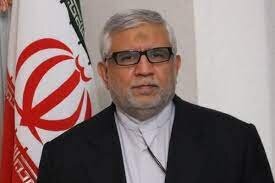Azerbaijan, Armenia should respect each other’s territorial integrity, ex-ambassador says

TEHRAN - Mohsen Pakaeen, Iran’s former ambassador to Baku, has told the Strategic Council on Foreign Relations (SCFR), that the blockade of the Lachin corridor by Azerbaijan has caused criticisms and dissatisfaction by Armenia.
The Lachin crossing is the route that connects Karabagh to Armenia and this crossing is the only exit from Karabagh to Armenia, where food, welfare and other necessary items are usually transferred to Karabagh, Pakaeen said.
The former ambassador said if the crossing remains closed, practically the Armenians living in the region will come under economic siege.
If the siege is prolonged, it will lead to a humanitarian disaster, the former diplomat predicted.
He stated that this issue is very important, especially in the field of transporting medicine and food in the winter season.
Armenia has declared that the Republic of Azerbaijan has completely closed the Lachin crossing, but the Azerbaijani side insists that the crossing is not closed. Azerbaijan says only in some cases, restrictions have been imposed, claiming that Armenia smuggles minerals from the area.
The former ambassador said the reality is that the Armenians of Karabakh are currently caught in a complicated situation and this dilemma may be due to the complete blockade of Lachin or restrictions on the movement of Armenians from Karabakh to Armenia and vice versa.
In any case, Pakaeen said, this situation is not a good and these actions are against the standards of human rights, and as a result, many innocent people have been exposed to danger and harm.
Referring to the role of regional players and international organizations, Pakaeen said Azerbaijan should be asked to abolish the restrictions but it has the right to monitor the mines in the region.
Preventing misuse of mines should not be an excuse to close the crossing, he suggested.
The Lachin region belongs to the Republic of Azerbaijan, and it has the right to exercise sovereignty over the region, and if the claim of mineral smuggling is true, it can easily prevent the action, the former diplomat pointed out.
Reminding that these Armenians are citizens of the Republic of Azerbaijan and should not be put in danger, Pakaeen noted it is possible that due to the non-opening of the Zangzor corridor, the Republic of Azerbaijan is looking for a countermeasure to block the Lachin corridor.
Yerevan has announced that it is ready to open the Zangzor corridor on the condition that its sovereignty over its territorial integrity of Armenia is preserved. The corridor is located in Sivnik province of Armenia and is considered part of the territorial integrity of the country.
Emphasizing that the Republic of Azerbaijan and Armenia should respect each other’s territorial integrity and observe international standards, the expert on the South Caucasus region said “the Republic of Armenia should accept that Karabakh is under the sovereignty of the Republic of Azerbaijan and adopt the solution to the issue based on this reality. And the Republic of Azerbaijan must accept that the Sionik corridor is inside Armenia and Yerevan has the right to exercise sovereignty over it.”
Noting that provocations by Turkey and the Zionist regime should not be ignored, Pakaeen said Turkey, which has a historical dispute with Armenia, is not interested in seeing a normalization of relations between Yerevan and Baku.
War, or at least not war and not peace, is desirable for Turkey, the former diplomat remarked.
Likewise, the Zionist regime, which sells weapons to Baku and also has intelligence and security cooperation with Armenia, is not interested in an end to the tension because in that case it will lose its benefits, he said.
However, joint efforts by Iran and Russia as mediators can help reduce the dispute between Armenia and Azerbaijan to create a better situation in the region, Pakaeen noted.
Referring to the negotiations in the past days between Russia, the Republic of Azerbaijan and Armenia, the former ambassador said Tehran and Moscow strongly oppose any change to the geopolitics of the region and it is essential to pay attention to this red line.
“Until the negotiations between Yerevan and Baku continue, and the parties do not seek to solve the problem through military means and there is no danger of threatening the geographical borders, Iran and Russia should try to reduce their problems through mediation. But if the military path is to be followed and the geographical borders are changed, which seems unlikely in the current situation, then other decisions should be taken into consideration,” the former diplomat suggested.
Pakaeen emphasized that it seems unlikely that Armenia will cede the Sionik corridor to the Republic of Azerbaijan by ignoring its territorial integrity, because in that case the connection between the north and the south of Armenia will be completely cut off and a large part of its territorial integrity will be lost.
The resistance shown by Armenia is intended not to lose control over its territorial integrity, he said.
At the same time efforts should be made for the Armenians of the Republic of Azerbaijan, who are in Karabakh, to get out of the siege, he added.
“The ambiguities of the Moscow Agreement, which was signed with the presence of Russia between Armenia and the Republic of Azerbaijan, should be resolved and it should be clarified precisely which country’s territorial integrity the Zangzor corridor belongs to. Of course, the Russians have declared that this corridor is within the territorial integrity of Armenia, but this issue should be included in the agreements. At the same time, Nagorno-Karabakh should return to the Republic of Azerbaijan and Baku should promise to respect the rights of the Armenian minorities of Nagorno-Karabakh and not create any problems for them. Otherwise, there is always the possibility of disagreements and scattered conflicts,” the former ambassador stated.
